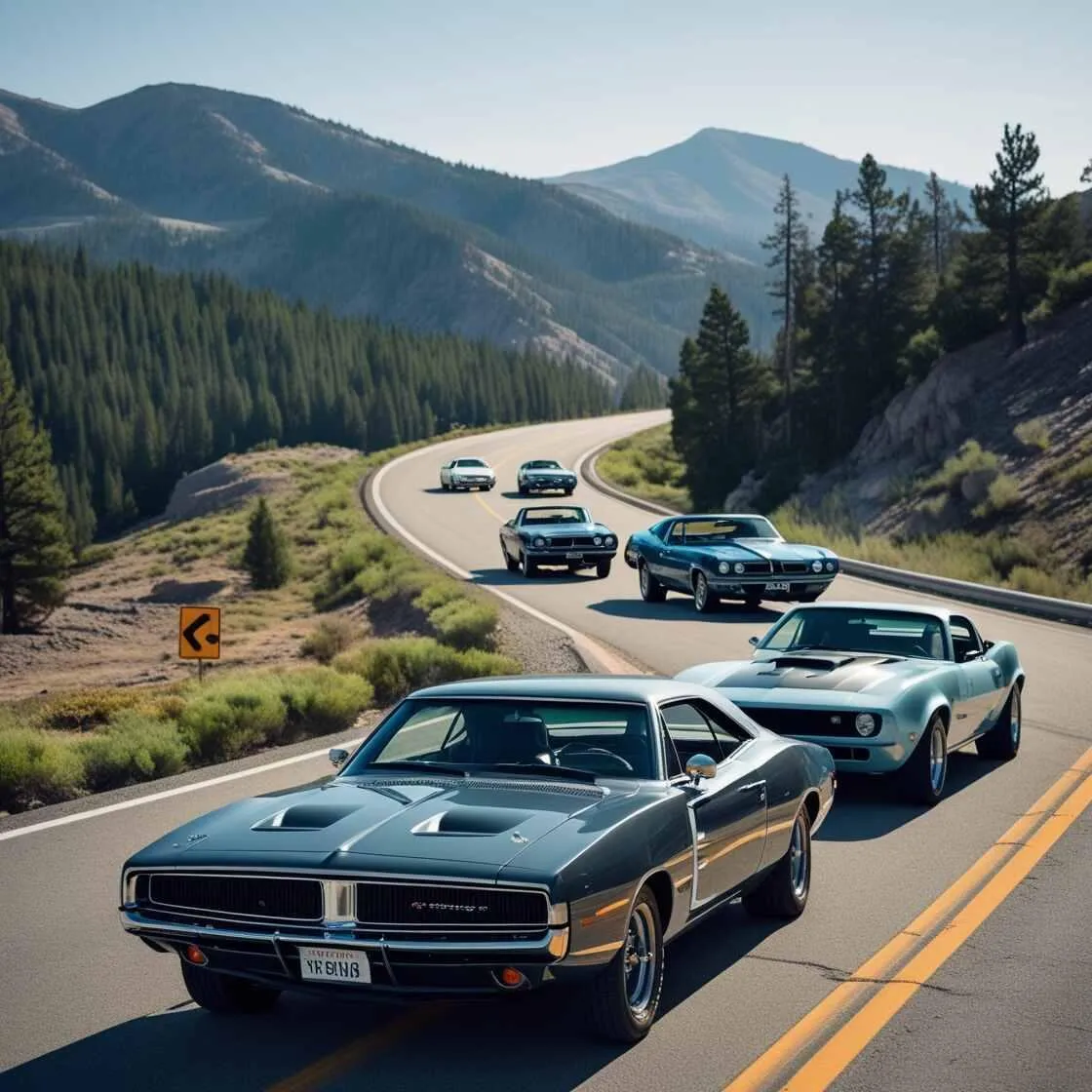
How to Use Flat Fee Registration to Protect Your Classic Car Collection
Classic car collecting celebrates old cars and their craftsmanship. A 1968 Dodge Charger or 1970 Chevrolet Corvette brings back good memories, but high taxes can spoil the fun. For example, a $250,000 car in California costs $25,625 in sales tax, while a $100,000 car in New York adds $8,880. The classic car world is worth $30 to $50 billion globally, with over 5 million collectible cars registered in the U.S. Many face big state taxes and tricky DMV steps.
Since the 1960s, when collecting took off with cars like the Ford Mustang, owners have found ways to cut costs. This guide shows how to lower taxes on your collection, handle registration issues, and keep your investment safe with strategies like Montana LLCs. You'll save thousands. If liens worry you, our hidden liens on car title guide reveals spots you can't afford to miss.
What Is a Classic Car Collection?
A classic car collection is any group of old vehicles you own for fun, money, or both. It could be a couple of fixed-up Ford Mustangs, three Porsche 911s, a 1957 Chevrolet Bel Air with a 1990s Japanese Kei truck, or even one 1965 Shelby Cobra. It's not about how much it's your love for saving car history that counts.
Classics are usually 25 years or older, but states differ. California says over 25 years for historical status (Vehicle Code Section 5004), Florida uses 30 years, and Georgia lets antique plates for 25+. These cars have special tax rules as drivable treasures.
In high-tax states, registering a $100,000 car means $8,880 to $10,250 in sales tax, plus DMV fees for checks or title proofs. Collections with specials like military Humvees or old bikes cost even more. Get the facts on your car's real value with our how to verify classic car originality checklist don't let fakes cost you big.
Why Are Classic Cars Taxed Differently?
Classic cars get special tax treatment because states see them as vehicles and growing assets. You pay sales tax when buying and federal gains tax when selling for profit. This mix creates extra money issues for collectors, plus state rules.
When Does a Car Become a Classic for Tax?
Cars turn classic at 25 years or older for taxes and registration, but states vary. California allows historical plates for over 25 years, cutting some fees but not sales tax (Vehicle Code Section 5004). Texas uses 25 years but needs safety checks unless skipped, while Florida waits 30 years. Knowing this helps plan costs and find breaks, though sales taxes still hit hard.
State Sales Taxes vs. Federal Capital Gains
Buy a classic, and you pay state sales tax on its worth. California's 10.25% in LA means $10,250 for a $100,000 car. New York is 8.88% ($8,880), Illinois 8.25% ($8,250), Texas 6.25% ($6,250), Florida 7% ($7,000). Sell for profit? IRS hits with 28% gains tax on collectibles (from 1986 Tax Reform Act, Publication 544).
A $250,000 car bought for $200,000 means $14,000 federal tax on $50,000 gain. Unlike new cars with standard fees, classics cost more due to rising value. For state breakdowns, our California car registration costs guide uncovers fees you need to dodge.
DMV Complexities for Classics
Registering classics can be tough, especially for changed or imported ones. California wants smog tests for mods, New York checks engine matches. Imported Kei trucks or custom builds need extra safety or import okay. Missing titles common with old cars slow things down and add costs. Georgia needs a title sworn statement if there is no record. These steps show why streamlining registration and simplifying DMV processes is key. If title issues hit, our avoid car title troubles guide has fixes you can't skip.
How Can You Simplify Registration for Old Cars?
Streamlining registration for classic cars is possible with smart planning. A Montana LLC provides a flat fee, hassle-free process using Montana’s friendly rules. Here’s how it works compared to other states, plus more tips.
Why Choose Montana?
Montana offers a simplified, flat fee registration process, similar to states like Alaska, Delaware, New Hampshire, and Oregon. Unlike South Dakota's 4% tax, Montana's flat fee saves $10,250 on a $100,000 car in California, $8,880 in New York, $7,000 in Florida.
No emissions or safety checks, unlike California or Illinois. Cars 11+ years old get permanent plates, no renewals (Montana Code Annotated 61-3-562). For a $500,000 collection in California, offers a flat fee. Unlock these perks with our Montana classic car registration guide savings you won't believe.
How a Montana LLC Works
A Montana LLC registers cars under a business, not you, simplifying state registration rules. The LLC owns the vehicle, and you drive as an authorized user. Steps:
Send ownership proof, like title or MCO, with VIN.
Set up LLC in Montana: easy papers, agent, $70 yearly fee.
Register under LLC, get plates good in all states.
This follows Montana law (MCA 61-3-303). A Texas collector with a $200,000 Porsche 911 saves $12,500 (6.25% tax), Florida with $150,000 saves $10,500 (7%). It takes days, permanent plates cut long costs.
Comparing Montana to Other States
South Dakota's 4% tax is $10,000 on a $250,000 car, and plates show home address could flag issues. Delaware requires some inspections, unlike Montana’s simplified process. Oregon requires in-state residency, so it’s not available for outsiders.
Montana’s flat fee, simplified process, and permanent plates make it a convenient choice. Georgia collector with $120,000 saves $8,400 (7% tax), no emissions. For best picks, our classic car registration any state guide compares options you need.
Additional Tax-Saving Strategies
Bundle Vehicles: One LLC for all cars cuts costs. Five $100,000 cars skip $51,250 in California, $44,400 in New York.
Fix Title Issues: Pros recover lost titles fast.
Plan Sales: LLCs don't cut gains tax, but advisors suggest trusts.
State Breaks: Arizona cuts fees for historic cars, but tax stays.
Consider a Montana LLC for a streamlined, flat fee registration process that makes managing your collection easier.

Can You Register Niche Vehicles Easily?
Your collection might include unique rides like a military Humvee, imported Kei truck, old Harley, or custom hot rod. These often face complex registration hurdles, but Montana’s rules provide a simplified, flat fee process while staying fully compliant.
Niche Vehicles and Montana LLCs
Montana handles odd vehicles that struggle elsewhere. California's smog or New York's engine checks complicate mods, and imported Kei trucks hit federal rules. Montana eases titling.
Military Vehicles: Humvee street conversion tough in Texas, easy in Montana.
Imported Cars: 1991 Honda Acty registers simple.
Classic Motorcycles: 1960s Triumph gets permanent plates. For bikes, our motorcycle registration guide has steps you can't miss.
Custom-Built Cars: Kit cars skip strict rules.
Vintage RVs: 1970s Winnebago no checks.
John in California saved $10,250 on a 1968 Dodge Charger with missing title fixed in days. Maria in New York saved $8,000 on a 1990 Nissan Figaro, skipping import hassle. Tom in Arizona saved $6,900 on a 1985 Humvee, no conversion woes.
Benefits for Niche Collectors
No Inspections: Skip emissions/safety, key for mods/imports.
Permanent Plates: 11+ years non-expiring, cuts costs.
Flexible Titling: Accepts varied proofs, great for niches.
These let you register unique vehicles cheap and fast. For modded rides, our registered highly modified cars out-of-state guide unlocks paths you need.
How to Streamline Classic Car Registration
Registering classics or niches can be messy with taxes and DMV, but easy steps save time/money.
Online Document Submission
Secure site for uploading title/MCO from anywhere. Dashboard tracks real-time, no DMV trips. Florida collector did three Mustangs, got plates in five days.
Transparent Pricing
Flat $995/vehicle covers LLC/registration. Beats Illinois inspections adding hundreds. Refund if issues.
Handling Complex Cases
Lost titles or specials like Humvees/Kei trucks need know-how. Sarah in New York fixed a 1970 Corvette, lost the title, and saved $9,000. Covers customs/imports. For errors, our fix car title errors when selling guide has fixes you can't ignore.
Fast Processing
Papers in, plates ship 3-5 days. Rush options available. Less downtime, more enjoyment.

Common Questions About Classic Car Taxes
Are Classic Cars Collectibles for Tax Purposes?
Yes, the IRS sees them as collectibles (Publication 544). Profit sale hits 28% gains tax. $250,000 car bought $200,000 means $14,000 tax. A Montana LLC provides a streamlined registration process at purchase for easier compliance.
Do You Pay Taxes on Selling a Car Privately?
Yes, 28% federal gains on profit. $50,000 gain = $14,000 tax. States may add. Montana LLCs reduce buy taxes.
When Does a Car Become a Classic for Tax?
Usually 25+ years, like California (Section 5004). Some states reduce fees for historical vehicles, while Montana offers a simplified, flat fee registration process.
Can I Register Multiple Vehicles Under One LLC?
Yes, one LLC for the whole collection cuts costs/management. Great for multiples or niches.
Is a Montana LLC Legal for Tax Savings?
Yes, the LLC owns the vehicle, and you drive following Montana law (MCA 61-3-303). Collectors use it to simplify registration and compliance.
Conclusion
Classic collecting is fun, but taxes/DMV can hurt. A Montana LLC provides a flat fee registration for older cars, saves $5,000-$15,000/vehicle and offers permanent plates.
For 1968 Dodge Charger, Humvee, or Kei trucks, Montana's laws simplify and save. With niche expertise and easy process, protect your investment. Get a free quote to start. For more savings, our classic car tax savings Montana guide has tips you won't want to miss.



